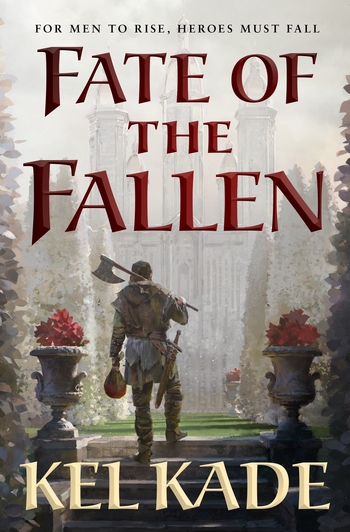When Aegon Targaryen landed on Westeros proper, he raised his close friend (and possible half-brother) Orys Baratheon to Lord of Storm’s End. Orys married the last daughter of House Durrandon—the line of the storm kings—and took on their ancestral seat, their sigil, and their traditional powers. It was as though House Durrandon has never existed and House Baratheon had always ruled in Storm’s End. On this antepenultimate episode of Game of Thrones, Aegon’s descendent similarly takes the eldest surviving Baratheon bastard and removes the fact of his bastardy in order to promote him to Lord of Storm’s End. With a single proclamation, the history of the Seven Kingdoms is rewritten, and Gendry Rivers (though shouldn’t it be “Waters”?) is suddenly Lord Gendry Baratheon.
Of course, the very next thing he does is seek out his lover and propose marriage. Gendry has always been a somewhat foolish romantic, eager to do what he’s told and both uninterested in and unaware of his gigantic role in the only game worth playing. Throughout “The Last of the Starks,” that theme played out at every turn, to tragic effect: one can rewrite history at the drop of a hat, but there is no ability to erase the effect that history has on one’s person.
Bronn articulates the ease with which histories can be rewritten, saying: “all the great houses started […] with a hard bastard who was good at killing people. Kill a few hundred, they make you a lord. Kill a few thousand, they make you king.”1 Rewriting history proves to be frighteningly easy. With the placement of a pin, Sansa rewrites Theon Greyjoy into Theon Stark. With one promise, Cersei replaces the Tully-Frey line of Lords Paramount of the Trident with whatever dynastic name Bronn will choose. With another, the Tully-Freys are written back in and the Tyrells are written out. Yara Greyjoy becomes Lady of the Iron Islands in a moment. Euron Greyjoy becomes King of all the Seas in the next. For all that Westeros is built on tradition, there are no shortage of opportunities to undermine it.
Bran, the living library of all Westerosi history tells Tyrion that he is not a figure worth envying. After all, as the Three-Eyed Raven, he “mostly lives in the past” and no longer has any desires. In this way, Bran is every bit as dead as the Night King. History with a capital “H” can be rewritten because It lacks the power to want something for itself. Its shape informs the present, certainly. Reflecting upon its sequences gives those who study it the ability to rebuke present actions or warn of dire consequences. But, for all that it is a central to the Seven Kingdoms, History has no will or course that must be followed.
But if capital “H” History—the force that Bran embodies and that Westeros’ traditions and conventions are built upon—is rendered mutable and without agency, the insidious personal histories of individual characters prove impossible to shake. By the end of the episode, Jaime and Brienne’s long-awaited romance is cut short by the Kingslayer’s inability to overcome his own past. Brienne attempts to rewrite her lover’s history by telling him that he is a good man, unlike his sister. But he is too overwhelmed by his own monstrous past to allow Brienne’s revisionism to redefine him.
Similarly, in their first scene together since the second season, a despondent Sandor Clegane tries to make the case for his fantasy of being a chivalric knight to Sansa Stark. In acknowledging the rape, gaslighting, and other forms of physical and psychological abuse she suffered at the hands of Ramsay Bolton and Littlefinger, he says “none of it would have happened if you had left King’s Landing with me.” He invites her to join him in the fantasy by asking her to become the object of his redemption and by opening up a regretful rumination on what could have been: their relationship transmuted into a chaste, courtly love story just like one of the songs of her childhood. She takes ownership of her history and refuses to let Clegane lament it—a powerful enough moment from a woman who, in the previous episode, insisted that the bravest thing a person can do is stare painful truth in the face—but she also implicitly reminds him that he cannot change his past; Sandor Clegane never wanted to be a knight and spent his life actively rejecting what he saw as a corrupt whitewashing of a violent truth. His attempt to rewrite history is foiled by his inability to transcend his past.
All of this tension between what can and cannot be rewritten is especially important in light of the fact that, for the first time in Westerosi history, all the power lies directly with women. Between Sansa, Daenerys, and Cersei, all the militarily viable states on the continent are headed up by women who refuse to share power with male supporters. “Last of the Starks” was a controversial episode for a number of reasons (most of them far more important than a misplaced Starbucks cup), but central among them was a recognition of the ways in which the show seems to imply that finally having women at the center of the Seven Kingdom’s power structure is not the same as triumphing over the entrenched underlying misogyny. We can and should interrogate whether Benioff and Weiss, who have been historically bad at representing women in nuanced ways, are being lazy and facile with their portrayal of this triumvirate—but it is also possible and important to take the show at face value in moments such as these and question whether or not there is an important lesson to be learned about the ways in which deeply cruel and misogynistic worlds are unlikely to suddenly produce female rulers who are able to transcend their past. For instance, Cersei cannot help but do as she has always done and use her tenuous power to bring other women low, be it frightening Sansa, torturing Ros, shaming Septa Unella, incinerating Margaery, poisoning Tyene Sand and the Queen of Thorns, starving Ellaria, or beheading Missandei. She may have spent the last two years rewriting herself as Westeros’ ruthless Lion Queen, but she is unable to see past Westeros’ patriarchal leanings and do anything but teach cruel lessons by stepping on the throats of other powerful women.
Buy the Book


Fate of the Fallen
And while we are right to be squeamish and outraged about the ways in which Benioff and Weiss have mistreated their characters of color, first by offing the majority of the Dothraki and Unsullied last episode and then by unceremoniously sacrificing Missandei—the only central woman of color the show has ever had—this time around, a generous and not incompatible reading of these events looks to the ways in which Daenerys’ racism is not only the product of some clueless showrunners but also numbers among her specific and monstrous failings. After all, she has always been more directly parallel to Robert Baratheon than to any other character on the show: more adept at conquering kingdoms than ruling them. This is, after all, the woman who has left every polity she has come across—from Qarth, to the old Ghiscari Empire, to Vaes Dothrak, to Winterfell—in utter ruins. The woman who styled herself as breaker of chains but refused to give a scholar who preferred slavery the choice to return to it. Who could not find a way to use her neoliberal centrist husband, Hizdahr zo-Loraq, to quell the Sons of the Harpy insurgency, and who ultimately left Mereen in the hands of a mercenary captain who had proven himself completely incapable of and uninterested in stewardship. In “Last of the Starks,” Dany allows the execution of her most stalwart supporter—the woman she once expressed solidarity with by explicitly stating that women were immune to the imperative of “Valar Morghulis”—in favor of a quest for power and vengeance and destiny and birthright which is predicted to result in the deaths of millions. Cersei may be an irredeemably bad ruler, but Daenerys offers a sham alternative.
Varys, who has always acted as the show’s conscience by virtue of his lack of genetic stake in the outcome of the game of thrones, lays out the complicated truth of the matter to Tyrion. In discussing the possibility of Jon Snow becoming king, he mentions that important among Jon’s qualifications is that he is a man and therefore more appealing to the decidedly backwards lords of Westeros. It is not the capital “H” History of Westeros that demands a male monarch. Cersei has already broken that precedent and proven that there is no divine right of masculinity. Rather it is the personal, mean, narrow-minded biases and bigotry of individual lords and smallfolk that will control the destiny of the Seven Kingdoms. And, just as they will be more likely to support a man, they may well be more likely to support the devil they know.
As the eleventh hour of the show approaches, Westeros has no claimant to the Iron Throne who seems worthy of it. A tragedy is in the offing—one born of what the series has always been best at showcasing: the failures and shortcomings of those it holds most dear. The question that remains is whether or not this is the story of a kingdom moving towards reform—rewriting a history in a way that uplifts its people—or one trapped in its idiosyncratic destiny, doomed to make the same mistakes it has always made.
Tyler Dean is a professor of Victorian Gothic Literature. He holds a doctorate from the University of California Irvine and teaches at a handful of Southern California colleges. More of his writing can be found at his website and his fantastical bestiary can be found on Facebook at @presumptivebestiary.
[1]“Last of the Starks.” Game of Thrones, created by David Benioff and DB Weiss, performance by Jerome Flynn, season 8, episode 4, Bighead Littlehead Productions and HBO, 2019.










